 Petzlover
Petzlover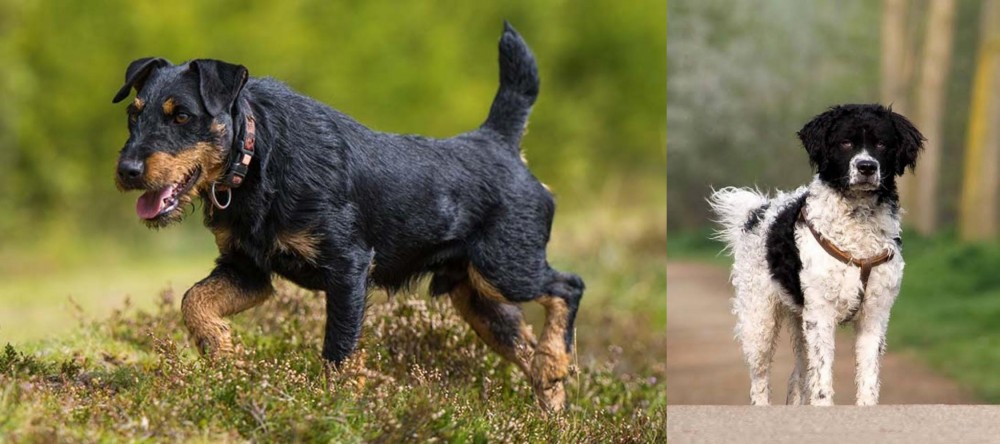 Jagdterrier is originated from Germany but Wetterhoun is originated from Netherlands. Jagdterrier may grow 19 cm / 7 inches shorter than Wetterhoun. Jagdterrier may weigh 25 kg / 55 pounds lesser than Wetterhoun. Both Jagdterrier and Wetterhoun has almost same life span. Jagdterrier may have less litter size than Wetterhoun. Both Jagdterrier and Wetterhoun requires Moderate Maintenance.
Jagdterrier is originated from Germany but Wetterhoun is originated from Netherlands. Jagdterrier may grow 19 cm / 7 inches shorter than Wetterhoun. Jagdterrier may weigh 25 kg / 55 pounds lesser than Wetterhoun. Both Jagdterrier and Wetterhoun has almost same life span. Jagdterrier may have less litter size than Wetterhoun. Both Jagdterrier and Wetterhoun requires Moderate Maintenance.
 Known as the German Hunt Terrier, the Jagdterrier hails from Germany and is a working terrier. In fact, the purpose of the Jagdterrier was for breeders to come up with an improved hunting terrier.
Known as the German Hunt Terrier, the Jagdterrier hails from Germany and is a working terrier. In fact, the purpose of the Jagdterrier was for breeders to come up with an improved hunting terrier.
The dog was developed at the turn of the 20th century, so its not a particularly old breed. There were a number of breeders who broke away from the German Fox Terrier Club, dedicating themselves to creating this newer terrier.
The first Jagdterriers were created by mixing the Old English Fox Terrier with a number of Black and Tan Hunting Terriers. Other dogs used to develop the Jagdterrier were German Pinschers, Welsh Terriers and English Wirehaired Terriers.
Today he is considered a superb hunting dog.The German Hunting Terrier Club was was founded in 1926.
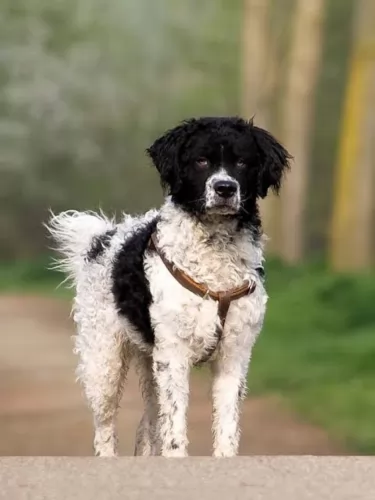 The Wetterhoun is a water dog developed in the 1500 or 1600s to hunt otters. The breed was developed by the Frisians in the Netherlands near the Northwest corner. In addition to catching otters in the lakes near by, they were also used as gundogs to hunt game. They are a fearless, tough and loyal working dog. They love the water and they are build for it with a waterproof coat and tight tail that is spiraled. They will swim happily in freezing cold weather as well.
The Wetterhoun is a water dog developed in the 1500 or 1600s to hunt otters. The breed was developed by the Frisians in the Netherlands near the Northwest corner. In addition to catching otters in the lakes near by, they were also used as gundogs to hunt game. They are a fearless, tough and loyal working dog. They love the water and they are build for it with a waterproof coat and tight tail that is spiraled. They will swim happily in freezing cold weather as well.
The Wetterhoun is rare and not seen outside of the Netherlands. Descendent of the Water Dog, that is now extinct, he is probably a relative of many spaniel types that also call the Water Dog their ancestor. Yet the Wetterhoun is not a spaniel or spaniel type.
The breed almost disappeared during World War II, like many others, they brought back and are now becoming more and more popular. The breed is only recognized by the Federation Cynologique Internationale and the United Kennel Club. AKC does not recognize them, but there are many hunting clubs and other registries that do. They are often promoted as one of the rare breeds.
 The Jagdterrier is a tenacious hunter, taking on lots of wild creatures such as boars, badgers and even cougars.
The Jagdterrier is a tenacious hunter, taking on lots of wild creatures such as boars, badgers and even cougars.
He is of medium size standing between 33 and 40cm in height and weighing 7-10kg.
He has a coat of black and tan which can also be a dark brown shade or be a charcoal color. The Deutscher Jagdterrier is a compact, well-proportioned dog with a wedge shaped head and flat skull. The ears are set high and go up before they come down to form floppy ears. The tail has always been docked at about one third of the tail. These days it is often left long, being carried raised.
Active, athletic and alert, the Jagdterrier is also social, intelligent, strong-willed and confident. He is a serious hunter but can make an excellent pet, especially when trained and socialized.
He is energetic so he will require owners who are prepared to include him in all their activities. They are good around children, but their hunting side makes them long to be outdoors busy with exciting activities.
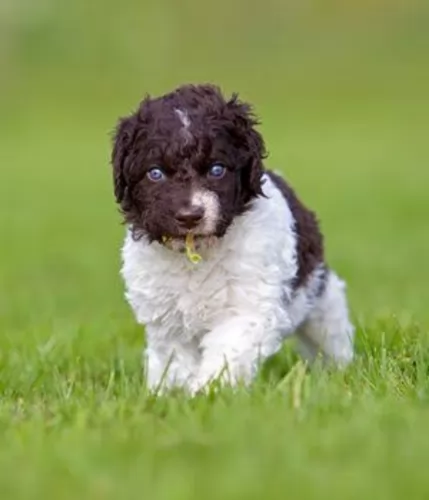 The Wetterhoun is a compact, medium sized breed weighing about 55 to 77 pounds. Great water dogs they are athletically built with low set ears hanging next to their heads, a waterproof coat, distinctive eyes with a very serious expression and a tightly curled tail held aloft over the back. Their coat is waterproof, somewhat oily, curly and thick. The fur is of a smoother texture on the ears, head, and legs. They can be solid black, solid brown, brown with white, or black with white.
The Wetterhoun is a compact, medium sized breed weighing about 55 to 77 pounds. Great water dogs they are athletically built with low set ears hanging next to their heads, a waterproof coat, distinctive eyes with a very serious expression and a tightly curled tail held aloft over the back. Their coat is waterproof, somewhat oily, curly and thick. The fur is of a smoother texture on the ears, head, and legs. They can be solid black, solid brown, brown with white, or black with white.
 Your Deutscher Jagdterrier is an intelligent dog who enjoys the company of his human family, particularly when they are active and can meet his high energy needs and his desire to be busy.
Your Deutscher Jagdterrier is an intelligent dog who enjoys the company of his human family, particularly when they are active and can meet his high energy needs and his desire to be busy.
They are quite wary with strangers and this makes them alert watchdogs. They are affectionate and playful with children if the children know how to respect them. Because of their hunting skills, they can be a bit of a threat around small animals in the home.
He is a quick learner and responds well to training and socialization. He will thrive on living in the countryside, but wherever you live with your Jagdterrier, give him plenty of exercise, a warm, dry bed, good food and your love and devotion, and he'll respond by being a super pet and companion.
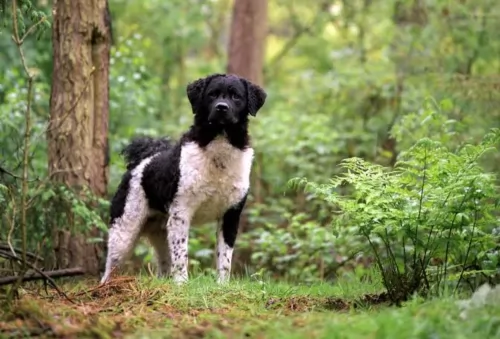 3.Adaptability – not a great apartment dog even though he is not that big. They need space. They need a job and they will finish their job at their own pace no matter what you say. It is impossible to train this trait out of them.
3.Adaptability – not a great apartment dog even though he is not that big. They need space. They need a job and they will finish their job at their own pace no matter what you say. It is impossible to train this trait out of them.
4.Learning ability Very high learning ability, very eager to learn and very smart. He is stubborn about finishing whatever job he is working on
 You’re not going to be taking a sick Jagdterrier to the vet often as this is generally a healthy dog breed who can reach 13, 14 or 15 years of age with good care.
You’re not going to be taking a sick Jagdterrier to the vet often as this is generally a healthy dog breed who can reach 13, 14 or 15 years of age with good care.
He may be prone to a genetic breed disorder known as Primary Lens Luxation. Sometimes people are given prescription eye drops to constrict the pupil ad help the subluxated lens from getting worse.
This is a painful hereditary condition that leads to blindness. It affects many breeds of dog, particularly terrier-type dogs.
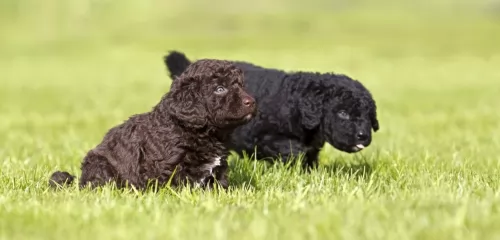 A hardy and healthy breed they do not have severe health issues. But like every his
A hardy and healthy breed they do not have severe health issues. But like every his
• Ear Infections – like any breed with hanging ears they can be prone to infection. This is particularly true because the dogs are in the water a lot. Be sure to clean and dry them after every water episode and inspect them on a regular basis even if the dog has not been in the water.
• Patellar Luxation – Knee cap issue with movement and inflammation. Can cause lameness and arthritis.
 Your energetic Jagdterrier will do well on a high-quality dog food, of which there are some good ones on the market.
Your energetic Jagdterrier will do well on a high-quality dog food, of which there are some good ones on the market.
If you do buy a commercially manufactured dog food, make sure that you read the instructions on the packaging so as to adhere to portion control. You can’t afford to have your pet becoming obese as this opens up a host of problems, and it can also shorten your dog’s life-span.
If you invest in high quality kibble, try to add in some nutritious and tasty home-made food such as cooked chicken, some brown rice or pasta and some vegetables. It is always wise to add in some raw meat from time to time as this promotes good health in your dog and prevents skin allergies.
Any diet for a dog should be in keeping with his age and his energy levels. Make sure your pet has constant access to fresh, cool drinking water.
Brush your Jagdterrier’s hair twice a week. It will keep the coat in tip top condition, but it also does your pet the world of good. He loves it when you take time out to be with him and to give him some special time. Brushing him also allows you to check him over for ticks and fleas.
Other grooming aspects for your dog will be to check on his nails and to clip them when they get too long. Ears should also be checked regularly to avoid a buildup of wax and dirt and teeth should be checked as well. Dental disease can lead to a host of illnesses which can be detrimental to the heart and kidneys.
Every dog needs different forms of exercise to remain lean and healthy. Options for exercise for your Jagdterrier can be going on walks, swimming and play time in the backyard.
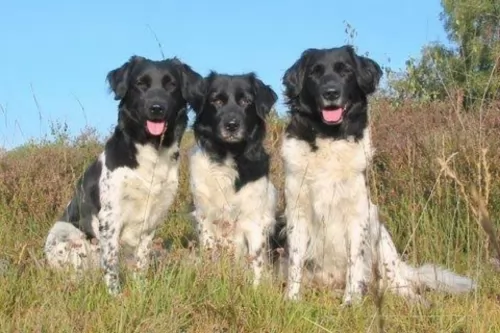 1Feeding the puppy -This is an active, hunting and swimming breed. They need good nutrition and high quality puppy food. A food formulated for active breeds or hunting dogs would be best. Feed your puppy in smaller amounts 3-4 times per day.
1Feeding the puppy -This is an active, hunting and swimming breed. They need good nutrition and high quality puppy food. A food formulated for active breeds or hunting dogs would be best. Feed your puppy in smaller amounts 3-4 times per day.
2.Feeding the adult - This is an active, hunting and swimming breed. They need good nutrition and high quality adult food. A food formulated for active breeds or hunting dogs would be best. Feed your adult twice per day.
4. Games and Exercises – This is an active working dog that needs a lot of exercise every day. A 30 minute walk is only the beginning. They need outdoor time to play and run. They need to swim if at all possible.